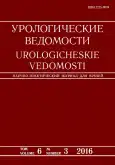Selective serotonin reuptake inhibitor and fertility potential of the men. Psychiatry and Urology. At the junction of related disciplines
- Authors: Korshunov M.N.1,2, Korshunova E.S.3,4
-
Affiliations:
- Central State Medical Academy
- Russian-German Centre of Reproduction and Clinical Embriology
- National Medical Research Radiological Center
- Research Institute of Health Organization and Health Management
- Issue: Vol 6, No 3 (2016)
- Pages: 19-25
- Section: Articles
- URL: https://bakhtiniada.ru/uroved/article/view/5861
- DOI: https://doi.org/10.17816/uroved6319-25
- ID: 5861
Cite item
Full Text
Abstract
Introduction. Iinfertility leads to emotional stress, which is a precipitating factor of depression. Stress has also been recognized as one of possible reasons of pathospermia and infertility. The aim of pilot study: to evaluate SSRIs effects on spermatogenesis and fertility in the treatment of depression.
Material and Methods. Study included 19 fertile men with depression of mild severity. None of them had any urological disorders. They were treated by fluoxetine 20 mg per day during 6 weeks. Semen analysis (WHO 5), level of DNA fragmentation were performed before, after the therapy and 3 months of drug discontinuation.
Results. All the men had normal semen parameters and level of DNA fragmentation before the treatment. After 6 weeks of the treatment, we fixed the reduction of sperm´s parameters and increasing the level of DNA fragmentation. After 3 mounts of drug discontinuation the mean semen volume, sperm concentration, motility, percentage of normal morphology increased and reverted to the normal levels. Sperm DNA fragmentation index decreased and it had the values less then before the treatment that positive correlated with the reduction of depression’s symptoms.
Conclusions. Using SSRIs may have a negative effect on spermatogenesis and male fertility within the therapy. The most changes of sperm quality (morphology and DNA integrity) were registered. 3 months of drug discontinuation the semen parameters reverted to the normal levels. The infuence of SSRIs in infertile men with depression are to be studied in more detail.
Keywords
Full Text
##article.viewOnOriginalSite##About the authors
Maksim N. Korshunov
Central State Medical Academy;Russian-German Centre of Reproduction and Clinical Embriology
Author for correspondence.
Email: m_korshunov@bk.ru
MD, PhD, associate professor, Department of Urology Russian Federation
Ekaterina S. Korshunova
National Medical Research Radiological Center;Research Institute of Health Organization and Health Management
Email: e_korshunova@mail.ru
MD, PhD, senior research fellow Russian Federation
References
- Rockliff HE, Lightman SL, Rhidian E, et al. A systematic review of psychosocial factors associated with emotional adjustment in in vitro fertilization patients. Hum Reprod Update. 2014;20(4):594-613. doi: 10.1093/humupd/dmu010.
- Bhongade MB, Prasad S, Jiloha RC, et al. Effect of psychological stress on fertility hormones and seminal quality in male partners of infertile couples. Andrologia. 2014;47(3):336-342. doi: 10.1111/and.12268.
- Peterson BD, Sejbaek CS, Pirritano M, Schmidt L. Are severe depressive symptoms associated with infertility-related distress in individuals and their partners? Hum Reprod. 2014;29(1):76-82. doi: 10.1093/humrep/det412.
- Jurewicz J, Radwan M, Merecz-Kot D, et al. Occupational, life stress and family functioning: does it affect semen quality? Ann Hum Biol. 2014;41(3):220-228. doi: 10.3109/03014460.2013.849755.
- Gradvohl SM, Osis MJ, Makuch MY. Stress of men and women seeking treatment for infertility. Rev Bras Ginecol Obstet. 2013;35(6):255-261. doi: 10.1590/S0100-72032013000600004.
- Dong YZ, Yang XX, Sun YP. Correlative analysis of social support with anxiety and depression in men undergoing in vitro fertilization embryo transfer for the first time. J Int Med Res. 2013;41(4):1258-1265. doi: 10.1177/0300060513483416.
- Chiaffarino F, Baldini MP, Scarduelli C, et al. Prevalence and incidence of depressive and anxious symptoms in couples undergoing assisted reproductive treatment in an Italian infertility department. Eur J Obstet Gynecol Reprod Biol. 2011;158(2):235-241. doi: 10.1016/j.ejogrb.2011.04.032.
- National Institute for Health and Clinical Exellence. Depression: the Treatment and Managment of Depression in Adults. 2009.
- www.nice.org.uk/CG90. Published October 28, 2009.
- Whitaker-Azmitia PM. The discovery of serotonin and its role in neuroscience. Neuropsychopharmacology. 1999;21(2):2S-8S. doi: 10.1016/S0893-133X(99)00031-7.
- Jiménez-Trejo F, Tapia-Rodríguez M, Queiroz DB, et al. Serotonin concentration, synthesis, cell origin, and targets in the rat caput epididymis during sexual maturation and variations associated with adult mating status: morphological and biochemical studies. J Androl. 2007;28(1):136-149. doi: 10.2164/jandrol.106.000653.
- Jiménez-Trejo F, Tapia-Rodríguez M, Cerbón M, et al. Evidence of 5-HT components in human sperm: implications for protein tyrosine phosphorylation and the physiology of motility. Reproduction. 2012;144(6):677-685. doi: 10.1530/REP-12-0145.
- Syed V, Gomez E, Hecht N. Messenger ribonucleic acids encoding a serotonin receptor and a novel gene are induced in Sertoli cells by a secreted factor(s) from male rat meiotic germ cells. Endocrinology. 1999;140(12):5754-5760. doi: 10.1210/en.140.12.5754.
- Maier U, Koinig F. Andrological findings in young patients under long-term antidepressive therapy with clomipramine. Neuropsychopharmacology. 1994;116(3):357-359. doi: 10.1007/bf02245340.
- Tanrikut C, Feldman AS, Altemus M, et al. Adverse effect of paroxetine on sperm. Fertil Steril. 2010;94(3):1021-1026. doi: 10.1016/j.fertnstert.2009.04.039.
- World Health Organization. WHO Laboratory Manual for the Examination and processing of human semen. 5th ed; 2010. 22-62, 157-161 p.
- Bataineh HN, Daradka T. Effects of long-term use of fluoxetine on fertility parameters in adult male rats. Neuro Endocrinol Lett. 2007;28(3):321-325.
- Kiran Kumar S, Vishnu, Pratibha T, et al. The spermicidal and antitrichomonas activities of SSRI antidepressants. Bioorganic and Medicinal Chemistry Letters. 2006;16:2509-2512. doi: 10.1016/j.bmcl.2006.01.078.
- Curti C, Mingatto FE, Polizello A, et al. Fluoxetine interacts with the lipid bilayer of the inner membrane in isolated rat brain mitochondria, inhibiting electron transport and F1F0-ATPase activity. Mol Cell Biochem. 1999;199(1):103-109. doi: 10.1023/A:1006912010550.
- Safarneiad MR. Sperm DNA damage and semen quality impairment after treatment with selective serotonin reuptake inhibitors detected using semen analysis andsperm chromatin structure assay. J Urol. 2008;180(5):2124-2128. doi: 10.1016/j.juro.2008.07.034.
- Tanrikut C, Schlegel P. Antidepressant-associated changes in semen parameters. J Urol. 2007;69(1):185-187. doi: 10.1016/j.urology.2006.10.034.
Supplementary files







